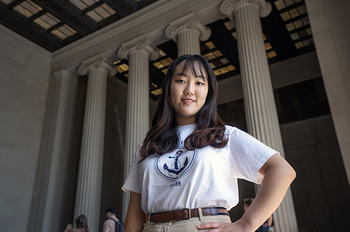When George Mason University graduate student Yuhyun Sihn worked as a student research fellow and a project intern for the Peace and Conflict Center Asia (PACSC Asia) in Mason Korea, she felt there were not enough opportunities for people to have a dialogue.
PACSC Asia strives to improve the relationship between people from North Korea and North Korean diasporas who have settled in South Korea and those already living there. That internship prepared Sihn perfectly for the work she is doing as a master’s student at Mason’s Carter School for Peace and Conflict Resolution and her internship this summer with the Sorensen Institute for Political Leadership.

“I want to create more spaces to discuss and share the future of the Korean peninsula with a variety of people,” said Sihn, who grew up in Incheon, Korea. “This [Sorensen] internship gave me a lot of insights and certainty in my vision to become a connector of people to resolve deep-rooted conflict in the Korean peninsula.”
After studying at Mason Korea, Sihn moved to the United States in January 2022 in time for the spring semester and completed her BA in conflict analysis and resolution in December 2022. Now she is working on her master’s in conflict analysis and resolution at Mason Square as part of Mason’s accelerated master’s program.
When she found out the Sorensen Institute of the University of Virginia’s 22nd Century Scholars summer internship program was open to students from other Virginia colleges, she decided to apply.
This year’s 22nd Century Scholars Program, which is a five-week virtual internship focusing on Virginia politics, was titled “Virginia—A Two-Party Dominion" and focused on common elements of how Republican and Democratic candidates have won gubernatorial elections since 2000, emphasizing themes such as education, jobs, health care, public safety, transportation, energy, and the environment.
“As I was interested in polarization, I thought this program would give me a great chance to explore solutions to division and polarization in society,” she said.
But first, Sihn needed to put in extra time to get herself up to speed on Virginia politics. “As the American political system and culture is quite different from the Korean ones, it was challenging to understand the unique sentiments and cultures that each region in Virginia has.”
Program speakers included former governors and lieutenant governors, policymakers, political strategists, data analysts, and journalists, who shared their experiences with the gubernatorial elections. Sihn even had the opportunity to ask Senator Tim Kaine how he and his team dealt with the divisive and polarized issues during his governorship.
Kaine told her: “Even though there is a person who has a different point of view from you, listen to it sincerely. This simple action helps to lower the temperature.”
“As a conflict scholar and a future practitioner, we will face so many issues or conflicts which are difficult to resolve and meet people with different understandings and interests,” Sihn said. “From his words, I realized it is important not to give up communication with people who have different opinions and views.”
“This [Sorensen] internship gave me a lot of insights and certainty in my vision to become a connector of people to resolve deep-rooted conflict in the Korean peninsula.”
~ Yuhyun Sihn
